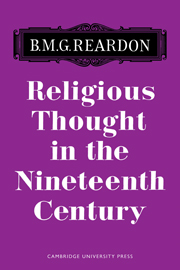Book contents
- Frontmatter
- Preface
- Contents
- Introduction
- PART I EUROPEAN
- PART II BRITISH AND AMERICAN
- 1 Coleridge
- 2 F. D. Maurice
- 3 Newman
- 4 Mansel
- 5 J. S.Mill
- 6 Benjamin Jowett and Essays and Reviews
- 7 Matthew Arnold
- 8 Scott Holland and Lux Mundi
- 9 The British Hegelians
- 10 Emerson
- 11 Josiah Royce
- 12 William James
- Index of Works Cited
8 - Scott Holland and Lux Mundi
Published online by Cambridge University Press: 12 March 2010
- Frontmatter
- Preface
- Contents
- Introduction
- PART I EUROPEAN
- PART II BRITISH AND AMERICAN
- 1 Coleridge
- 2 F. D. Maurice
- 3 Newman
- 4 Mansel
- 5 J. S.Mill
- 6 Benjamin Jowett and Essays and Reviews
- 7 Matthew Arnold
- 8 Scott Holland and Lux Mundi
- 9 The British Hegelians
- 10 Emerson
- 11 Josiah Royce
- 12 William James
- Index of Works Cited
Summary
The Oxford Movement, in outlook and in aim, was unyieldingly conservative. Its enemy had been ‘liberalism’, its palladium ‘the dogmatic principle’. But even in Oxford, as certainly elsewhere, the foe had continued to advance and traditional religious belief was thrown more and more upon the defensive. Essays and Reviews had been an attempt on the part of a group of liberal churchmen to mediate between new knowledge and progressive ideals on the one hand and the Church's historic creed on the other. A new generation was to witness how this same spirit of mediation was to imbue the heirs of the Oxford revival itself. Its manifesto was a second volume of essays, Lux Mundi, published in 1889, the editor of which was the young Charles Gore (1853–1932), then Principal of Pusey House, Oxford, but afterwards bishop successively of Worcester, Birmingham and Oxford, and probably the most forceful and influential figure in the Church of England. The book's contributors, who included, besides Gore himself, E. S. Talbot, R. C. Moberly, J. R. Illingworth and H. S. Holland, had all been influenced to a greater or lesser degree, by both F. D. Maurice and the leader of the new school of English idealist philosophers, T. H. Green.
- Type
- Chapter
- Information
- Religious Thought in the Nineteenth Century , pp. 338 - 351Publisher: Cambridge University PressPrint publication year: 1966

